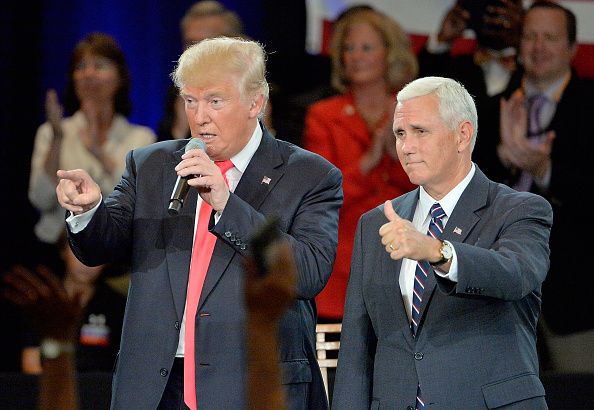Play all audios:
Evangelical Christians overwhelmingly support President Donald Trump because they believe he'll cause the world to end. Many have questioned why devout evangelicals support Trump, a man
who has bragged about sexual assault, lies perpetually and once admitted he never asks God for forgiveness. Trump's lack of knowledge of the Bible is also well-known. Nevertheless,
many evangelical Christians believe that Trump was chosen by God to usher in a new era, a part of history called the "end times." Beliefs about this time period differ, but it is
broadly considered the end of the world, the time when Jesus returns to Earth and judges all people. Jerusalem has a central role as the city of prophecy and the place where the end of times
plays out. According to the prophecy, a 1,000-year period of peace must be followed by seven years of tribulation, during which wars, disease, and natural disasters will lay waste to the
earth. In the book of Revelation, Israel is described as a nation that exists during the time of tribulation, and Jerusalem's Jewish temple is resurrected during this period. The last
temple was destroyed around 70 A.D, and today there is a mosque on the Temple Mount where the previous two temples are believed to have stood. Evangelicals believe that a unified Israel with
control over Jerusalem will facilitate the construction of a new Jewish temple, and set the groundwork for the end of times. That's where Trump comes in. "What kick-starts the end
times into motion is Israel's political boundaries being reestablished to what God promised the Israelites according to the Bible," Nate Pyle, a pastor and author of a book about
Jesus, told _Newsweek_. On December 6, Trump officially recognized Jerusalem as the capital of Israel, a controversial move that was lambasted by U.S. allies around the world. The eastern
part of Jerusalem has long been envisioned as the future capital of a Palestinian state if and when a two-state solution is reached between Israel and the Palestinians. By recognizing
Jerusalem as the capital of Israel, many critics say Trump killed any chance of a negotiated peace deal in the Middle East. But evangelical Christians threw their full weight behind the
decision. Currently, over half of all American evangelicals support Trump's presidency, and the announcement about Jerusalem plays a big role in that. "Most evangelicals subscribe
to a belief in pre-millennialism, the belief that the second coming of Christ will begin a 1,000-year period where Christ will rule over a peaceful and prosperous earth," Neil J. Young,
a religion historian, told _Newsweek_. Young, who holds a Ph.D. in history from Columbia University, writes frequently on evangelical culture and politics. "Israel is a key part of
this story, too, as Christians believe that events there are fundamental to bringing about the end times," Young continued. "At this point, Trump's decision to recognize
Jerusalem as the capital of Israel is the only concrete thing that his evangelical supporters can point to as part of fulfilling biblical prophecy to bring about the second coming of
Christ." Meanwhile, the evangelical belief in the end times also includes the eventual conversion to Christianity of the Jewish people. The scenario begins when Christ comes to Earth to
take the living Christians who believe in him to heaven and resurrect the dead who were true Christians, an event called the rapture. Afterward, it is believed that the Antichrist will
reign on earth during the seven-year period of tribulation. "In this period, many Jews will recognize the Antichrist is a false God and will turn to Jesus. At the end of the seven
years, Christ will return to earth with an army of angels and defeat the Antichrist," Young told _Newsweek_. For some, evangelicals simultaneously hold views that are supportive of
Israel and deeply anti-Semitic. "Evangelicals view themselves as sympathetic to Israel, but the underlying belief is motivated by a desire to see the Jewish people 'turn to
Jesus,'" Blake Chastain, a former evangelical who hosts a podcast on evangelicalism, told _Newsweek_. Chastain, who grew up in an evangelical family, dedicates his time to
explaining what he calls the "subculture" of evangelicalism. He said the evangelical belief that Jews will eventually accept Jesus is problematic. "I'm not sure
evangelicals see that as offensive to the Jewish faith or dismissive of the covenants God made with the Jewish people, but it certainly seems so to me," Chastain added. To be sure,
Trump's stance on Jerusalem isn't the only reason evangelicals support him. During his campaign for president, Trump promised to protect religious liberties and elect anti-choice
Supreme Court Justices. "He was so specific about protecting Christian liberties, it wasn't holistically religious liberties," Pyle explains. "That spoke to a lot of
Christians, and then he also has this stance on Israel." Meanwhile, Young says that Trump's unlikely election victory also creates the impression that Trump's victory was
ordained by God. "For his evangelical supporters, there's a sense that Trump's unlikely election to the presidency proves that he has been chosen by God," Young told
_Newsweek_. "He shouldn't have won the election, so the thinking goes, so the fact that he did—and that victory came only via the Electoral College, no less—just demonstrates that
only God could make it happen."

